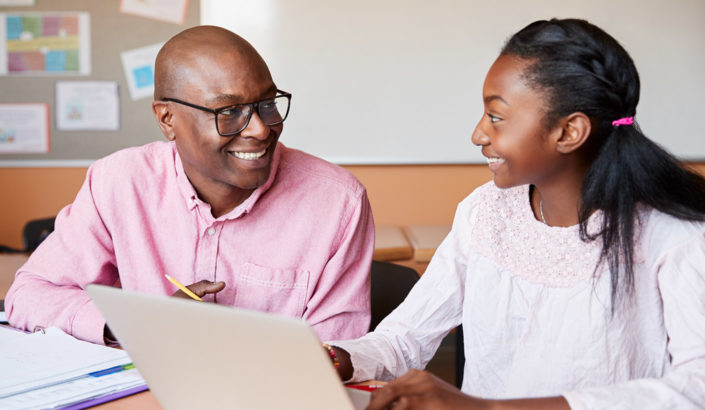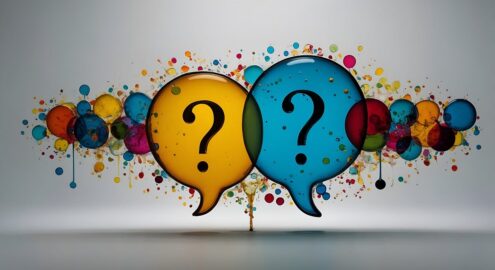What Are They?
Everyone can point to a teacher who made a difference in his or her life, and also to one who made life miserable for a short time. Why? Because the teacher-student relationship is at the heart of teaching. As Rita Pierson noted in her famous TED talk, “Kids aren’t going to learn from someone they don’t like.”
But what is a positive teacher-student relationship? Here are some examples based on research that asks both teachers and students what makes this relationship so special:
For Teachers: According to educators, a positive relationship with a student is close and supportive, but not overly dependent. A teacher who cares about his or her students believes that every child can learn, but differently and at different rates, sets high expectations, is warm and trusting, and strives to keep the relationship conflict-free. He or she also uses humor and admits mistakes, sets clear boundaries, and is open, honest, and approachable.
For Students: Students told researchers that good teachers listen to and take a personal interest in students’ lives. They show respect, value the individuality of each student, and are kind and polite. A caring teacher gives honest, but kind feedback, and offers second chances. They help students with schoolwork, manage the classroom well, and, perhaps most importantly, they plan fun activities.
For Higher Education: At the college level, students prefer professors who are approachable—they say “hi” on campus, smile often, and stay after class to talk to students. They also set high expectations, are fair, honest, trustworthy, respectful, open, supportive, and encouraging.
Why Cultivate Them?
Decades of research clearly show that positive teacher-student relationships are extremely important for student outcomes in all categories—feelings, attitudes, behavior, and achievement—and at all ages.
Students do better overall with caring teachers.
- Studies have found that for students from pre-K to 12, positive student-teacher relationships increase engagement, motivation, prosocial—kind and helpful—behavior, and academic achievement.
Seeing students as individuals is key to their well-being and success.
- When teachers use practices that are sensitive to students’ individual differences and needs and that also include student voice, their students tend to be more motivated and show higher academic achievement; they also feel better about school, participate more, and show less disruptive behavior across grade levels.
Negative student-teacher relationships can have long-lasting impact.
- Conflict-ridden relationships with teachers in kindergarten predict worse grades, work habits, and discipline problems into late elementary or even middle school.
Relationships matter at every age.
- In preschool and kindergarten: When their relationships with teachers are more emotionally supportive and less conflictual, preschool students become more socially and academically competent; similar effects occur for kindergarteners.
- In elementary and middle school, close, positive student-teacher relationships are associated with greater student engagement in learning and better social and behavioral outcomes in general, including less risky behavior.
- In high school, students who connect with their teachers are less likely to engage in risky behavior, including substance abuse, sexual activity, and suicide.
- In university, students are less likely to drop out, and they show more commitment, engagement, effort, intellectual development, and academic achievement.
Teachers, too, benefit from good relationships with their students.
- They experience the joy of teaching, helping to maintain their commitment to the profession by preventing burnout.
Practice Collections
Practices
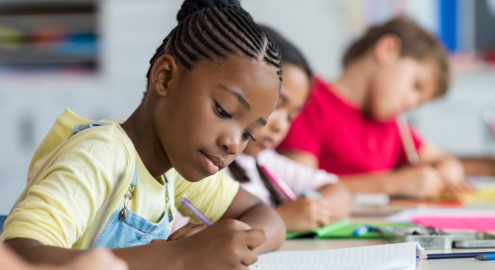
Dialogue Journals for Middle School Students

Looking for Gratitude in School
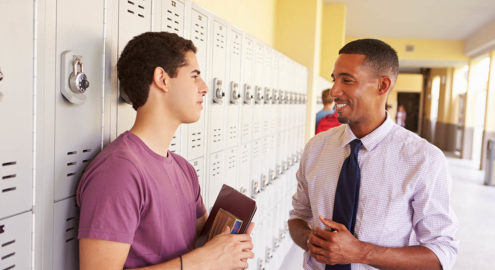
Thank You for Believing in Me
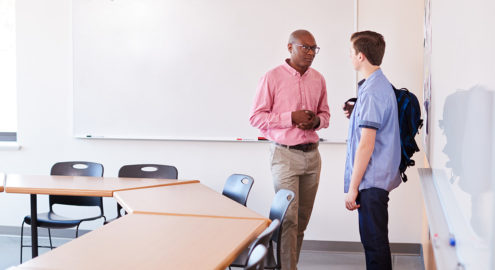
Giving Wise Feedback

Loving-Kindness for Adults

Do you want to dive deeper into the science behind our GGIE practices? Enroll in one of our online courses for educators!


